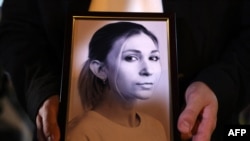Ukrainian journalists are paying tribute to a colleague who died in Russian custody.
Viktoria Roshchyna had been in Russian detention for over a year. Ukrainian officials say that the 27-year-old freelancer died on September 19.
Roshchyna is the 12th Ukrainian journalist to die as a result of their work since the full invasion of Ukraine, and the first to die in Russian custody, according to Oksana Romaniuk, executive director of the Ukrainian nonprofit, the Institute of Mass Information.
“The fact that she died in captivity makes you worry about other journalists who are in captivity,” Romaniuk said, adding that Russia is currently detaining at least 29 journalists. “We are very concerned about the destiny of our colleagues.”
A member of Ukraine’s military intelligence said Thursday that Roshchyna had been due to be part of a prisoner exchange, and it is believed she was being moved to Moscow for that purpose when she died.
Efforts had been underway to free Roshchyna and other Ukrainian journalists detained or listed as missing in Russian-held regions, the intelligence official was quoted as saying.
Andrii Yusov, a spokesperson for Ukraine's military intelligence, confirmed to VOA that Roshchyna had been on a list of Ukrainians due to be returned.
“We all hoped that it should end positively in the near future,” he said.
As a freelance journalist, Roshchyna worked for several news outlets including Ukrainska Pravda, Hromadske, and VOA sister network RFE/RL. She had been recognized for her war coverage by the International Women’s Media Foundation.
Her colleagues believe that the journalist was captured in the Russian-occupied Ukrainian territory in August 2023, where she went as a reporter. But her whereabouts were not disclosed until April, when her family received a letter from Moscow officials confirming Roshchyna had been taken into custody.
Roshchyna was known for her coverage of rights issues and war crimes.
Nataliya Gumenyuk, the founder of the Public Interest Journalism Lab, remembered Roshchyna from their time working together at the independent media outlet Hromadske.
“She would do the hardest stories about the vulnerable, about the bad people,” Gumenyuk said, adding that Roshchyna chased corrupt officials, criminals and gang leaders in pursuit of the truth.
“She was very brave, and it was extremely challenging also to stop her,” Gumenyuk said. “Not exactly because she kind of wanted to be famous. She just felt it was her duty.”
Roshchyna reported during the siege of Mariupol, and in March 2020 was detained for 10 days by Russian forces.
That brush with danger did not deter her and in 2023 she again traveled to Russian-occupied areas to report on conditions.
“She's just this type of journalist who [was] pursuing the truth. So that's why it makes [her death] even more painful,” Gumenyuk said.
The Kyiv Independent reported that Roshchyna had been held in a pre-trial detention facility in the Russian city of Taganrog. The Media Initiative for Human Rights group has said that the facility is known for using torture, including electric shocks on detainees.
Yevheniia Motorevska, who leads the War Crimes Investigations Unit of the Kyiv Independent, told VOA “This is one of the harshest colonies, where Ukrainian prisoners and prisoners of war are treated terribly.”
Motorevska, who worked with Roshchyna at Hromadske, added that when the full-scale invasion started the two of them talked about the dangers.
But, Motorevska, “It was very important to her. She always said that you can't write about events as important as a full-scale invasion based on the words of the officials or press releases. That a journalist should always work in the field and write about what they saw with their own eyes.”
“She saw the mission of her life in this, she saw her mission as a journalist in this, and in principle, nothing was more important to her than journalism,” Motorevska said.
The European Union in a statement said that when Russia arbitrarily detained Roshchyna it “assumed full responsibility for her safety, health and physical integrity.”
“The EU demands a thorough and independent investigation that clarifies all the circumstances of [Roshchyna’s] death as soon as possible,” the EU statement said. “The EU remains deeply concerned about Russia's ongoing harassment, intimidation and violence against journalists and media workers covering war zones and frontlines.” The international community is demanding accountability.
“The circumstances of Viktoria’s death are alarming and concerning,” said Emily Wilkins, president of the National Press Club in Washington. “We call on Russia to release all journalists being held in their prison system immediately. We further call for the U.S. to bring personal sanctions, under the Magnitsky Act, against all Russian personnel involved in the chain of custody of Viktoria Roshchyna.”






